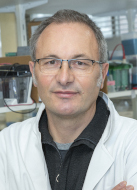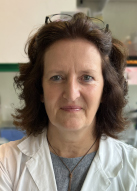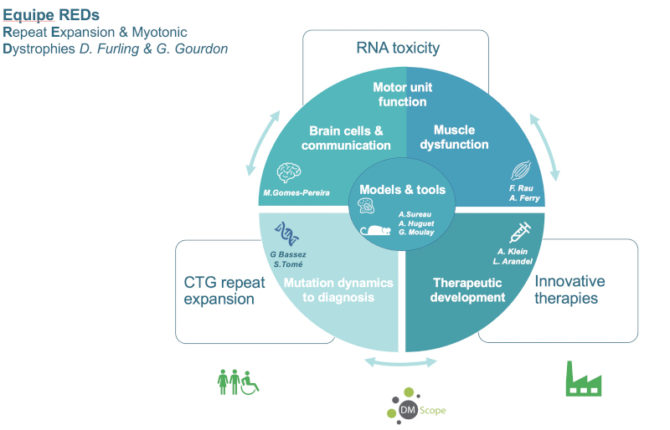
 Co-team leaders: Denis Furling & Geneviève Gourdon
Co-team leaders: Denis Furling & Geneviève Gourdon
Research topics of our team are mainly focused on Myotonic Dystrophy (DM), one of the most common neuromuscular diseases in adults, and more particularly on DM type 1 (DM1) also known as Steinert disease.
DM1 is characterized by myotonia, progressive muscle weakness and atrophy, cardiac conduction defects, cataracts, endocrine and gastrointestinal troubles and neurologic impairments. Based on disease onset and symptoms severity, five forms of this multisystemic disease were described: late-onset, adult, juvenile, infantile and congenital. To date, there is no treatment for this inherited disorder however several therapeutic approaches are under development.
DM1 is an autosomal dominant disorder caused by an unstable expansion of CTG repeats located within the 3’UTR of the DMPK gene. Instability of this expanded CTG tract is found at the somatic level during lifetime of the patients but also across successive generations, which represents the molecular basis of the anticipation phenomena present in this disease. DM1 is an RNA dominant disease and mutant DMPK transcripts containing expanded CUG repeats (CUGexp-RNA) are retained within the nucleus as discrete aggregates (or foci) that sequestered RNA binding proteins from the MBNL family involved in RNA metabolism regulation. Functional loss of MBNL leads to alternative splicing misregulation and several splicing defects in CLCN1, BIN1, DMD and SCN5A were associated with myotonia, muscle weakness, dystrophic features and cardiac conduction defects, all DM1 symptoms. However, additional mechanisms are involved in the complex pathophysiologic processes of this disease affecting several cell types and tissues.
The REDs team has been created in 2019 by the merge of Gourdon and Furling teams, including also the groups of Bassez who coordinates the French DM registry DM-Scope. The aim of the team is to synergize efforts to speed up translational research for this complex disease in order to provide therapeutic options for DM1 patients. Skills and expertise of the team are dedicated to DM1 research from the mutation to the understanding of pathophysiologic mechanisms with the help of cell and animal models, to the development of innovative therapeutic approaches and the setting up of preclinical studies and clinical trials for this neuromuscular disease.



